Meet the ICU nurse who examines and diagnoses patients like a boss
When Faith Hwang told her parents she wanted to be a nurse, they thought it was a job with no career progression. As an advanced practice nurse at Tan Tock Seng Hospital, she is proving otherwise — to their delight now.
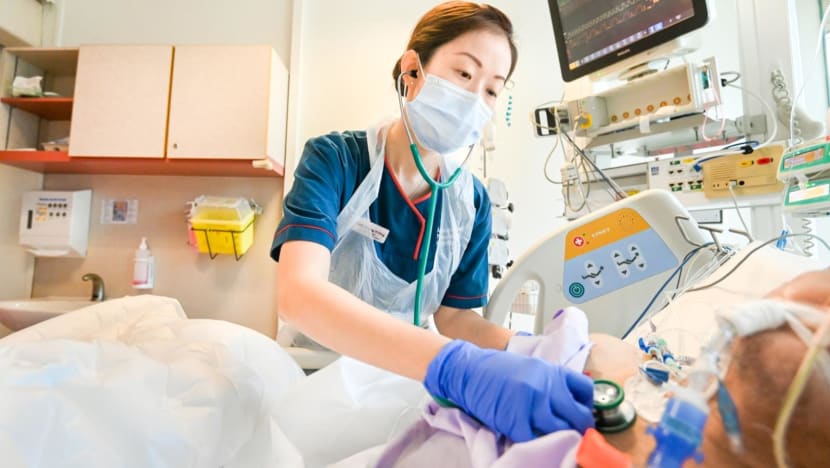
Faith Hwang has the training to diagnose conditions, order therapies and perform complex procedures like a bedside heart ultrasound. (Photo: Liew Zhi Xin/CNA)

This audio is generated by an AI tool.
In partnership with Care To Go Beyond
SINGAPORE: Stethoscope round her neck, Faith Hwang moves from patient to patient in the medical intensive care unit (ICU) of Tan Tock Seng Hospital (TTSH), assessing their condition and checking their diagnostic results.
Examining one patient, she says: “Your blood pressure … looks okay. We’ll see whether we can cut back a little of the medicine for you. We’ll also (perform) a formal heart ultrasound.”
Hwang is not a doctor, however. She’s a nurse, one with advanced training that requires a master’s degree in nursing.
“In terms of theoretical knowledge, there’s no doubt about it — she’s on a par (with) or possibly better than some of the junior MOs (medical officers),” says her supervisor Lew Jin Wen, a senior consultant in respiratory and critical care medicine at TTSH.
“She knows the protocols and procedures here. She’s been around here the longest.”
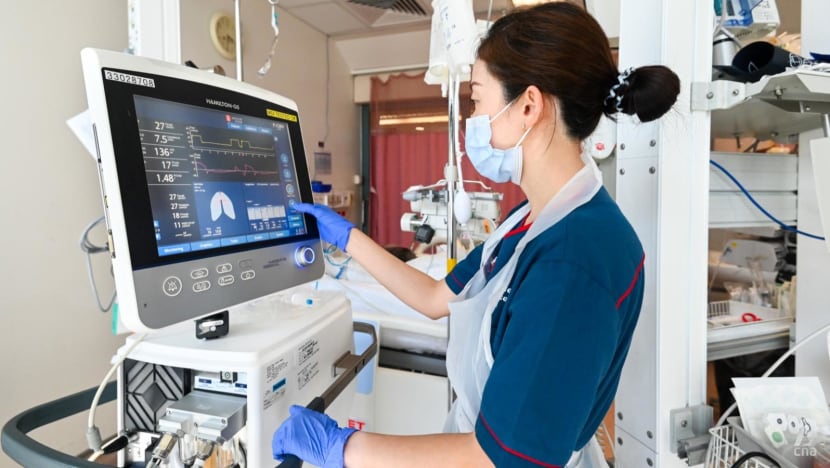
Hwang is an advanced practice nurse (APN), which means she has the medical expertise to diagnose conditions and provide complex nursing care. Among other things, APNs can run clinics independently, order tests and manage patients with stable chronic conditions, such as diabetes, hypertension and mental health problems.
She is not only an APN, but also the first APN in a medical ICU at TTSH. But not everyone can easily appreciate the depth of her training. “Even my family didn’t really know what an APN does,” says the 36-year-old.
A ‘BRIDGE’ BETWEEN DOCTORS, NURSES
A typical morning for Hwang begins with her checking in with her ICU patients before ward rounds. When the ward rounds are about to start, she briefs the doctors on clinical findings and presents plans for the patients’ care that day for discussion.
WATCH: Life as an ICU advanced practice nurse — Advising doctors, examining patients like a boss (14:59)
At the same time, she also attends to patients’ basic nursing care.
Describing the role of APNs, Lew says: “They’re nurses … (who have) accreditation to perform as medical officers.”
Staff nurses will report physiological findings — such as a patient’s abnormal blood pressure or pulse rate — to a doctor, but upon advancing to APNs, they can “take it a step further” and order therapies and further investigations based on their diagnosis, he adds.
Yet, the public often overlook this expertise. “There are family members who still aren’t very familiar with the APN role, and sometimes they still (demand) to speak to a team doctor,” says Hwang.
“We don’t refuse them, … but I do make a point of standing beside the doctor so that it’s acknowledged that the APN role is part of the ICU team.”
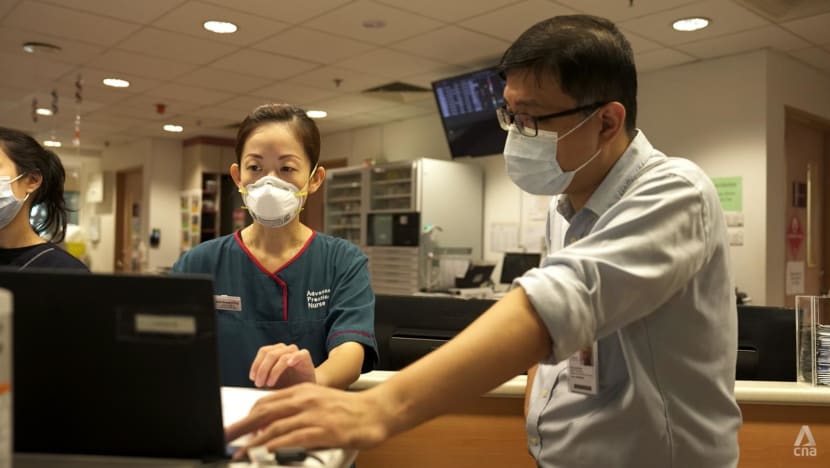
To her, these moments are part and parcel of the job, which also requires her to be sensitive to patients and their families in a time of crisis and tough decisions.
“I don’t tend to get too emotional about such comments because, honestly, I don’t blame the family members,” she says. “With time and with more interaction, the public would know more about this role and be more accepting of it.”
To become an APN, she had to complete an 18-month National University of Singapore master’s programme. The decision to do so came after she spent nine years as a staff nurse, which gave her the skills and resolve to undertake the next step.
“I enjoyed my interactions with patients. And I really wanted to do more for my patients in terms of being able to be the first responder when there’s any change in their condition in the ICU,” she says.
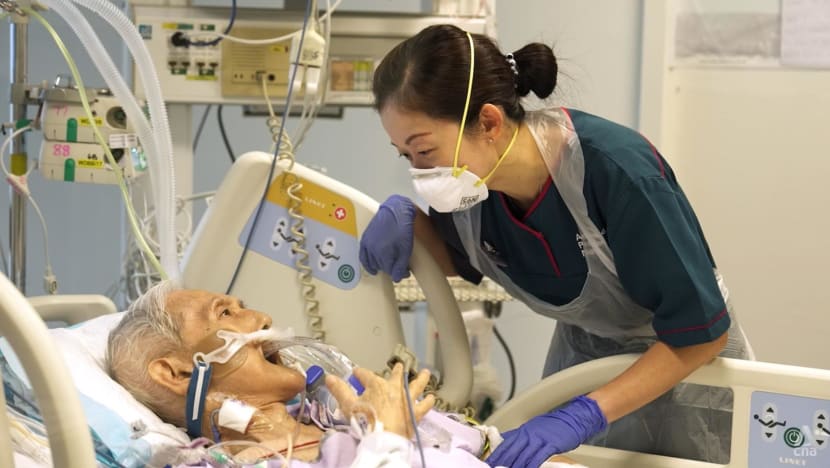
Lew shares that even before Hwang became an APN, she had shown a lot of “intellectual curiosity” about the way the medical team “thinks about the patient”. “She’d (take) me aside and ask me about what (treatment) we were planning,” he recounts.
As an APN, she is also a “bridge” between doctors and nurses, especially when it comes to broader efforts to improve the quality of care in hospital. “Faith’s been on both ends of the spectrum: nursing as well as medicine,” says Lew.
“She knows how a medication order on our side will translate into what the nurse has to do on the other side.”
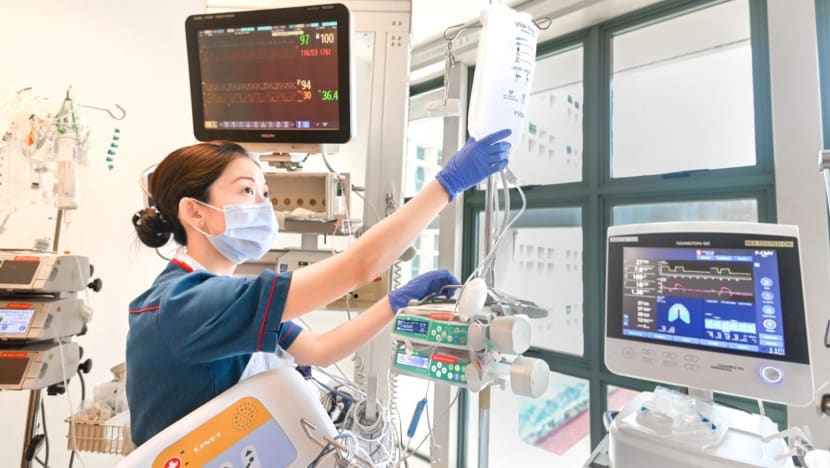
MORE THAN JUST ‘CLEANING UP AFTER PATIENTS’
Asked how they felt as parents when she first told them she wanted to be a nurse after completing her A levels, her father, Hwang Tseng Ho, replies: “It came as a surprise to us.”
They tried to persuade her to consider other courses at university, such as business administration, which offered “a wider career choice upon graduation”, thought her father.
“Nursing back then, to them, was only about cleaning up after patients,” she recalls.
We didn’t have a nurse in the family, and we didn’t have anyone close (to) the family who was in healthcare. So the information for my parents at that point in time would’ve probably been limited.”
Her peers from school were also surprised at her decision. “There were friends who commented (on) why I wanted to join nursing after going through A levels,” she says. “There were misconceptions that to be a nurse, you didn’t have to have a lot of academic background.
“But having gone through nursing school (and) further studies, I can assure you that educational background (and) all the training are very important foundations … to become a nurse.”
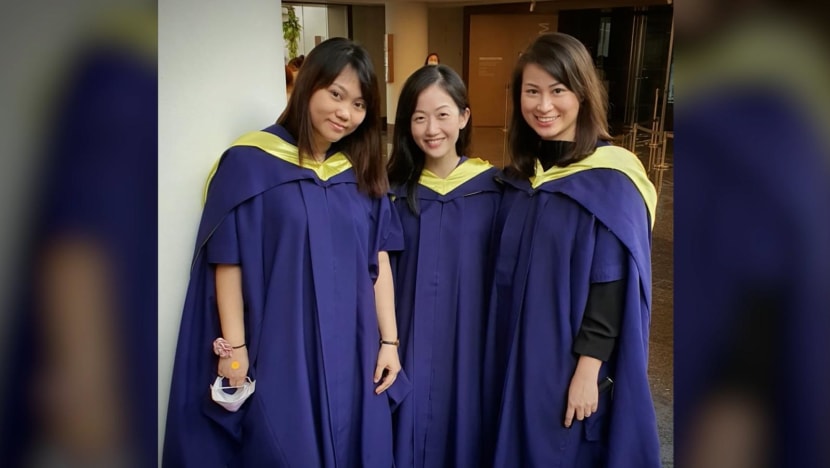
Her career ambition was in part inspired by her experience with her late grandmother, who had suffered an acute stroke when Hwang was in junior college.
“We went to Malaysia to visit her in hospital and (felt) very lost. But I just felt prompted to go up to her to clean her eyes,” says Hwang. “She couldn’t speak at that point in time, but I remember seeing her tear up. And I believe that at that moment, I brought her comfort.
“I thought to myself, if such small actions can bring so much comfort to a loved one, how much more nursing can offer.”
Over the years, Hwang has won her parents over and changed their perception of the profession, especially when she furthered her studies to develop her nursing skills.
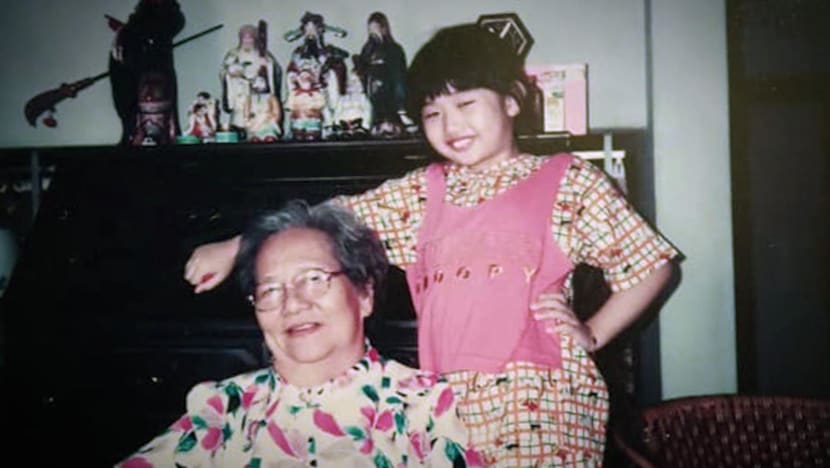
“After I graduated from university, I moved on to a specialist diploma in critical care nursing. And they’re like, ‘Oh, you mean there’s a specialisation for this?’” she recounts. “They were very happy and encouraged that there’s actually very good career progression in the nursing profession.”
When she told her parents she was pursuing a master’s, they bought her a stethoscope in a show of support.
“I was most proud of her when she completed her master’s in nursing and was the top student in the class of 2021,” says her father. “We bragged about her being the top student, as all parents do.”
Her mother, Theresa Hwang, adds: “She was always very enthusiastic. Before she leaves the house to go to work, she’ll say, ‘I’m going to save the world!’ … That won us over.”
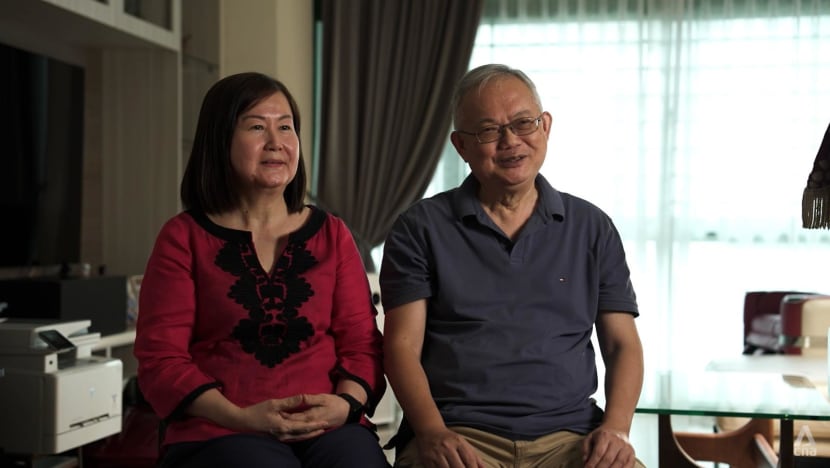
Becoming an APN is but one of four advanced career tracks for nurses in Singapore: After gaining experience as a staff nurse, one can pursue nursing management, education, clinical nursing — as Hwang did — or nursing research.
A nurse who embarks on the education track, for example, could manage and develop nurses’ careers or go into academia and become a lecturer who draws up nursing curricula. On the management track, a nurse could become a director of nursing, looking into manpower planning and policies affecting nurses.
Hwang herself occasionally holds mini-lectures and group discussions for her nursing colleagues, on topics like X-ray interpretation.
“Nurses are always very passionate to learn, but sometimes they don’t have the opportunity to do so,” she says. “I’d like to be the one to share my knowledge with them so that everybody on the ground can grow together.”
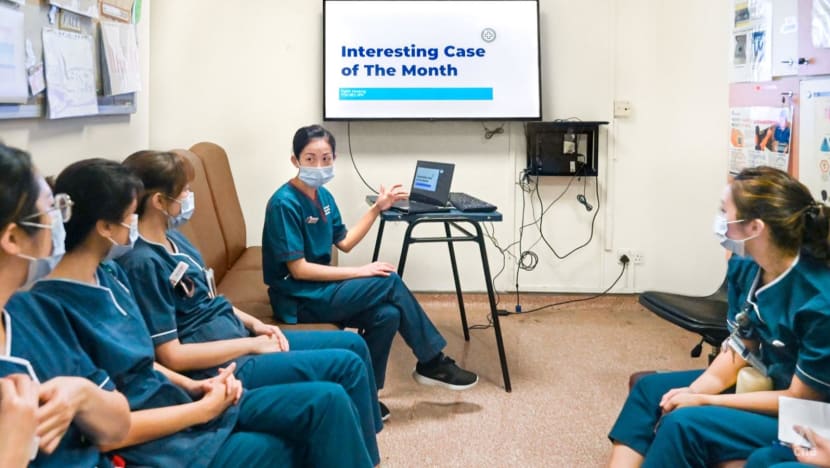
Her colleague Lee Jun Zhang, a TTSH senior staff nurse, shares that she inspired him to pursue his advanced diploma in nursing.
“Faith’s been guiding me since I was a junior nurse here in the medical ICU,” he says. “After the APN course, it deepened her medical knowledge even more, which also helps all the nurses around the ward.”
“There’s very good progression in nursing,” stresses Hwang. “(It’s) not just about bedside nursing. There are a lot of specialty areas one can consider. If it’s something that you like to do, and you feel that this is a calling, I’d say go for it.”
FINDING MOTIVATION IN BEDSIDE INTERACTIONS
After 14 years on the job, there have been times when it has been challenging, she acknowledges.
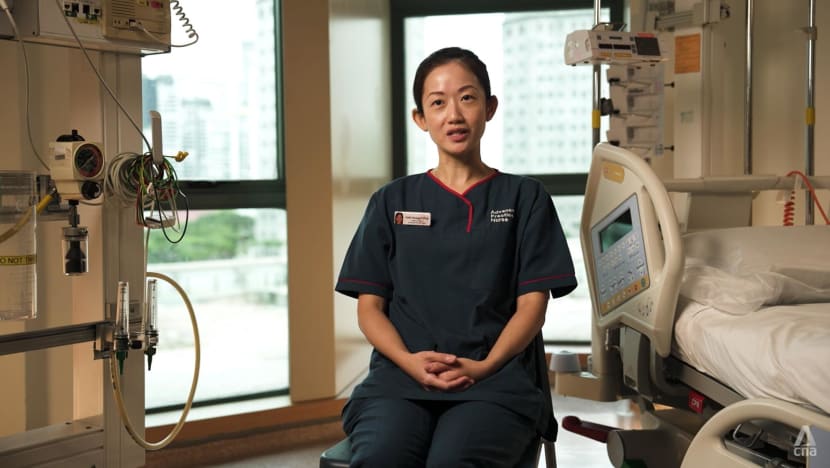
She once went the extra mile to ensure a patient’s smooth transfer out of the ICU, only to be greeted with ire by the patient’s family.
“They weren’t comfortable with the environment he was in and demanded that we … push him back to the ICU,” she recalls. “Their tone was quite condescending and demanding. … Moments like this (get) you down a little.”
Amid the “thankless” moments, she finds motivation by focusing on the patient’s well-being. “Do we really need patients or families to thank us? That’d be nice. But I think what really pushes us on in this journey as a nurse is seeing the actual improvement in the patient’s condition,” she says.
And it is the positive moments that are more sharply etched in her memory. “Every patient encounter is very special because not only do I learn from the case (and) the conditions I see, I also think these interactions teach me a lot of life lessons,” she says.
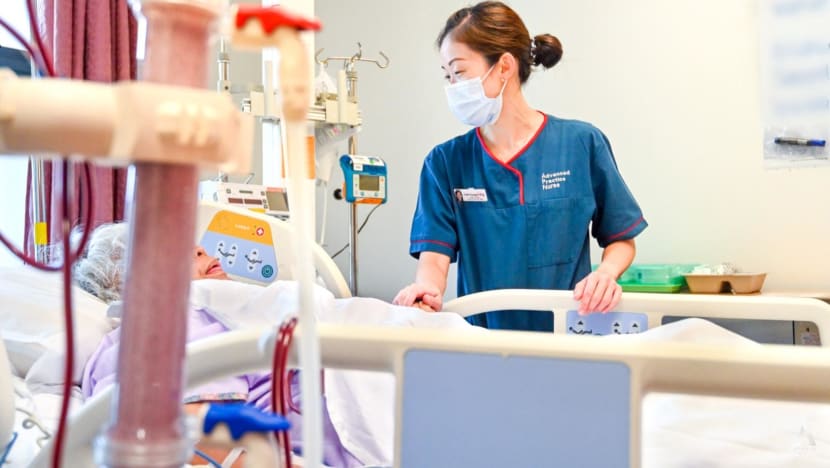
She remembers an elderly patient newly diagnosed with cancer that had very likely spread. “She didn’t want all these extraordinary measures, and she just wanted to be comfortable, to spend her last days with her husband,” recounts Hwang.
“I remember (the husband) being very sweet, being very loving. … They got to spend her last days together (before) she passed on a few days later.”
While the ICU is often associated with “very aggressive things, like intubations, like CPR with resuscitation”, Hwang says experience has taught her that it is “not only a place where we intensively care for the sick, it’s also a place where we want to intensively care for the dying”.
“All these interactions have taught me about cherishing relationships, because things can happen at any time, and (cherishing) relationships is very important — to say the things we want to say and not hold them back,” she adds.
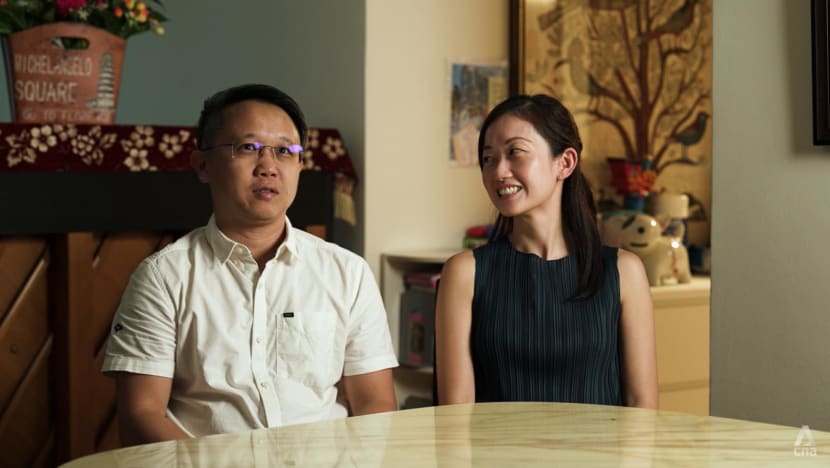
The “people interaction” side of nursing — “because of our time by the bedside with the patients” — is something she appreciates. “There have been people (who’ve asked), why not choose medicine instead of nursing?” she shares.
“Although I do look into the medical aspect, into the diagnosis and management of patients now, I still remember what I’ve learnt as a nurse and cherish the time I have with my patients to make them feel comforted.”
Lew observes that her “innate ability to connect with people” is exceptional. “Taking care of any critically ill patient is actually a series of negotiations between us (the doctors), the nursing staff and the patient’s next of kin. And she does that very well,” he says.
Despite her parents’ initial concerns about nursing as a career, they are now proud of her, especially when they can see how much she loves her profession. Her father adds: “I’d tell my younger me, in those days, that we should’ve been more open-minded towards such a career.”
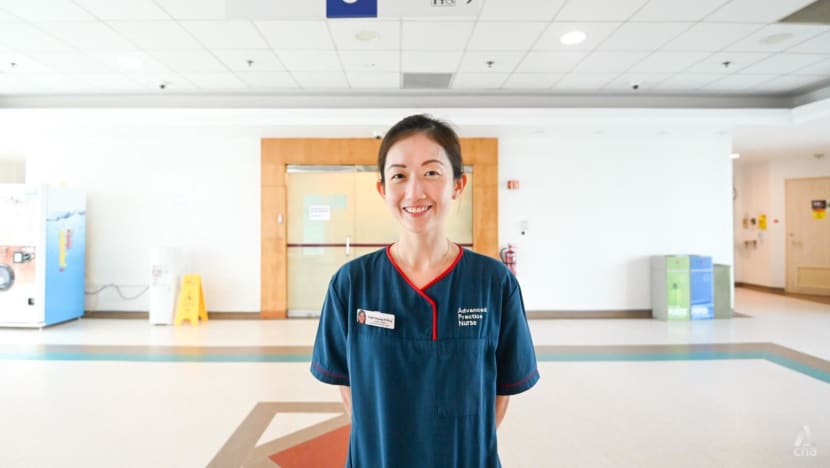
She feels it takes “great courage” to put one’s hand up for the nursing profession. “I always think compassion and this willingness to help somebody isn’t something that everyone’s born with,” she reflects.
“It’s truly a calling. And if your child comes to you and says they want to be a nurse, … I’d encourage you to support them because you’re going to see how they flourish. And that’s very rewarding.”
















